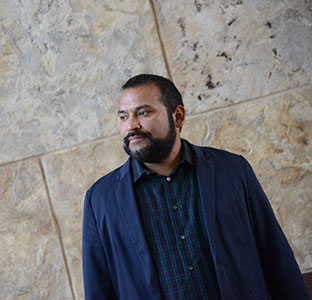Meet a Roadrunner: Marco Cervantes is hip-hop's Mexican Step Grandfather

(Photo by Deborah Silliman Wolfe/College of Engineering)

(Photo by Deborah Silliman Wolfe/College of Engineering)
(May 13, 2015) -- Meet Marco Cervantes. Better known by his stage name, the Mexican Step Grandfather, this UTSA faculty member uses music to share his experiences and insights with the world.
Cervantes has toured and performed as a rapper and DJ at venues across the country and abroad, including stops in Mexico City and Spain. He has released several albums under the Mexican Step Grandfather moniker, including "Occupied State" and "Estere-ere-o."
Cervantes' hip-hop collaborative – Third Root, with Charles "Easy Lee" Peters and DJ Chicken George – has even performed in high-profile music festivals like South by Southwest (SXSW) in Austin.
Born and raised on the north side of Houston, Cervantes was exposed to hip-hop and rap at an early age. The music was a part of his daily life growing up.
"In my neighborhood, I saw the daily intersections between Latinos and Black Americans and was affected by the ways our cultures interacted," he said. "hip-hop was such a huge part of my life. You couldn't go anywhere in my neighborhood without hearing it blasting from stereos or seeing young crews practicing their rhymes."
By middle school, Cervantes had already been a part of several hip-hop groups, performing at school functions and neighborhood events as a rapper. By the time he entered high school, he was in the studios recording mix tapes and having his songs played on local radio stations.
As he grew as a musician, Cervantes sought to use his music to explore his experience as a Chicano – Mexican-American – living in the U.S. through the medium that he knew best: hip-hop. Culturally and socially conscious artists, he said, have always influenced his music.
"I was inspired by artists like Talib Kweli, Immortal Technique and Chuck D, who weren't afraid to share their truths in their music," he said. "I wanted to tell my story – the story of the Chicano in Texas – the best way I knew how: through my music. I want to explore the systems that have created inequality in our society, the socio-economic divides and prejudices that are ever-present in so many peoples' lives."
Cervantes' love of hip-hop has even bled into his scholarship. As an assistant professor in the Mexican-American Studies Program, his research specialty is the blending of Black and Latino culture through music.
"When I began studying Literature in college, I found myself interested in examining hip-hop as literature," he said. "This music was just becoming accepted as a scholarly pursuit. It was exciting to see academics examining the music of my youth as literature, and I decided that this was what I also wanted to focus my career on."
In his classes, Cervantes explores Latino cultural expressions, Mexican-Americans in the Southwest, and the history of Black and Latino cultural relationships. As a professor, he has used his musical connections and background to bring unique viewpoints into classroom discussions.
"My solo music has to do with understanding the Chicano experience and politicizing our community," he said. "Through the musical component of my classes, the students and I can have frank discussions about issues facing Mexican-American and other minority populations today."
Cervantes is currently working on a new album, a book exploring Black and Chicano musical interactions throughout history, and he is even branching out into poetry, which he sees as an extension of his work as a performer.
Listen to Marco Cervantes' albums on BandCamp. Listen to Third Root's albums on BandCamp.
-------------------------------
Do you know someone at UTSA who is achieving great things? Email us at social@utsa.edu so we might consider your submission for an upcoming installment of Meet a Roadrunner. Read more profiles at the Meet a Roadrunner website.
Connect online with UTSA on Twitter, Facebook, YouTube and Instagram.
Events
Join the PEACE Center and Wellbeing Services for Denim Day, a day of learning about the importance of consent and why we wear denim on the last Wednesday of the month each April during Sexual Assault Awareness Month. Stop by our Denim Day display to take a photo in front of our Denim Wall, spin the "Is It Consent?" Wheel, and get a Concha or goodie.
Student Union Window Lounge, Main CampusLearn to use Zotero®, a citation manager that can help you store and organize citations you find during your research. Zotero can generate bibliographies in various styles, insert in-text citations and allow you to share sources with collaborators.
Virtual EventThis event will acknowledge graduating seniors from the McNair Scholars program at UTSA before inducting the new cohort of scholars into the program.
North Paseo Building (NPB 5.140), Main CampusAt this memorable celebration, UTSA graduates will be introduced one-by-one to cross the stage and accept their doctoral degrees.
Arts Building Recital Hall, Main CampusRoadrunner Walk is an event for graduating students to have a memorable walk on campus to celebrate an important milestone and their achievements. Graduates will walk along the Paseo while being celebrated by the UTSA community, friends, and family members.
Student Union Paseo, Main CampusCelebrate the accomplishments of College of Education and Human Development, College for Health, Community and Policy, College of Sciences and University College.
Alamodome, 100 Montana St.Celebrate the accomplishments of Alvarez College of Business, College of Liberal and Fine Arts and Klesse College of Engineering and Integrated Design.
Alamodome, 100 Montana St.

